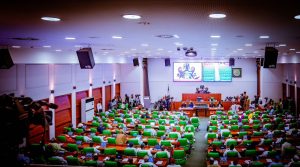
In a significant move, the House of Representatives Committee on Solid Minerals has put forth a proposal to allocate five per cent of solid minerals revenues to host communities. The committee’s chairman, Jonathan Gaza, made this announcement during a public policy dialogue on Nigeria’s minerals and mining legislation, held at the National Assembly Complex in Abuja.
Gaza stated that the Nigerian Minerals and Mining Act (Amendment) Bill, currently under consideration, aims to ensure that five per cent of the total revenue generated from all minerals mined is directed towards the development of host communities. This legislative measure seeks to establish a Mines Inspection and Environmental Agency, which would enhance oversight of mining activities. Additionally, it aims to bridge the gap between the Federal and State Governments, empowering the Mineral Resources and Environmental Management Committee to carry out effective and joint oversight.
“The Solid Minerals Development Company Bill, which is being established, designates 75 per cent ownership to the private sector and 25 per cent to the federation of Nigeria. The bill prioritizes community development and environmental concerns,” explained Gaza. He further highlighted that the Petroleum Industry Act already designates three per cent of annual operational expenditure for host communities. Gaza emphasized that the proposed bill intends to allocate five per cent of the revenue from all minerals mined to the host communities, addressing the informality prevalent in the sector. He expressed confidence that this program would facilitate review and improvement.
During the session, Nasarawa State Governor Abdullahi Sule drew attention to the fact that non-Nigerians who operate in the solid minerals sector generate significant profits, while Nigerian citizens receive meager benefits. Sule called for institutional reforms to enhance the sector’s performance, thereby ensuring the welfare of Nigerians.
“One community in Nasarawa received a paltry compensation of N700 million. Although they were pleased, it pales in comparison to a time when lithium was valued at approximately $76,000 per metric ton,” Sule remarked. He stressed the need for comprehensive reforms in the solid mineral sector and the formulation of policies that prioritize the interests of Nigerians, warning against the consequences of inaction.
Deputy Speaker of the House of Representatives, Benjamin Kalu, remarked on the potential significance of the proposed bill, describing it as a turning point in Nigeria’s exploitation of mineral wealth. Kalu emphasized that the nation’s vast mineral resources have remained largely untapped and overlooked due to overreliance on oil. He highlighted the challenges posed by insecurity, inadequate infrastructure, and a shortage of skilled manpower, which have hindered the development of the solid mineral sector. Kalu expressed confidence that the proposed amendment bill would address these challenges.
“Despite boasting over 40 commercially viable minerals, the mining sector contributes a mere 0.3 per cent to our Gross Domestic Product. Today, our duty is to reverse this trend. There are signs of renewed vigor in our mining industry, driven by a collective determination to diversify our economy, create jobs, and unlock the vast potential lying beneath our soil,” emphasized Kalu. He cited the 2016-2025 Mining Industry Development Roadmap, which seeks to increase the sector’s GDP contribution to three per cent by 2025, as evidence of progress. Projects such as the Segilola Gold Project in Osun State, which are privately led, have injected millions of dollars into the economy and attracted much-needed investment.
The proposal to allocate five per cent of mining revenue to host communities reflects a significant step towards ensuring equitable distribution of resources and fostering the inclusive development of Nigeria’s solid mineral sector.

